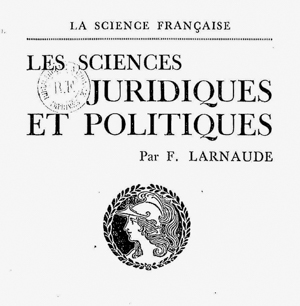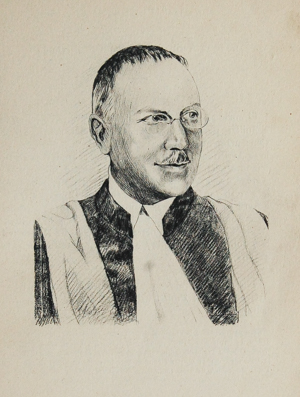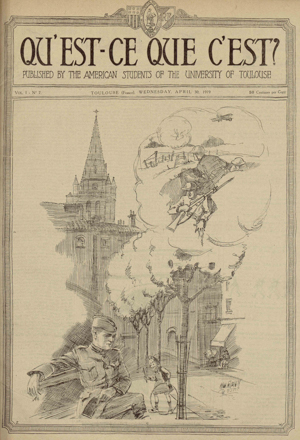In 1915, the World’s Fair left the Old Continent for the United States ; this was not a first, since Philadelphia, Chicago and St. Louis had already hosted this event before. Recovering from the terrible earthquake of 1906, the city of San Francisco was this time chosen to receive the exhibitors of the twenty-four participating countries ; between March and December 1915, it would welcome about nineteen million visitors. The event, as always, revolved around a major theme. For this iteration, it was the Panama Canal, completed and inaugurated a year earlier, that was in the spotlight : the exhibition was renamed “Panama- Pacific” for the occasion. Indeed, this canal, whose titanic work began in 1882, allowed an unprecedented expansion of maritime trade and contributed to the strongpour lire la suite…
Tag: United States
Professor Geouffre de La Pradelle in America (1914-1917)
The act of violation of the neutrality of Belgium and Luxembourg, committed by Germany in the first days of August 1914, has powerfully helped shape a representation of the conflict in which France and its allies might pose as virtuous champions of the law threatened by German barbarism. But it also had the paradoxical effect of placing neutral countries at the heart of a confrontation in which they refused to enter militarily. For Germany’s offhand attitude towards two states benefiting from such status, recognized and protected by international treaties which it had itself ratified, and its contempt for those treaties, reduced to the rank of “scraps of paper” by Chancellor Bethmann-Hollweg, were not only a radical challenge to the emerging discipline that was then internationalpour lire la suite…
American students at the Toulouse Faculty of Law
Shoulder Arms, Charlie Chaplin’s film, released in the United States on October 20, 1918, features Charlot trying to train in an army camp. When evening comes, he falls asleep and wakes up in a trench in France sharing the expectation and the idleness of his companions in misfortune. He volunteers for an espionage mission. Returning a hero, having saved a young French woman and captured Kaiser Wilhelm II, Marshal Hindenburg and the Kronprinz. Chaplin was no stranger to the poilus when his film was released in France on April 20, 1919 under the name Charlot Soldat. In 1915 at the Bois de la Vache in Somme, Swiss Frédéric Louis Sauser, alias Blaise Cendrars, while he was serving in the French army as a foreign volunteer,pour lire la suite…
The University Library of Dijon on the war front (14-18) : continuity and American influence
Forword The University of Burgundy was founded belatedly in 1722 as a single faculty of Law. Closed during the Revolution, it was one of only twelve Law Schools reinstated by decree in 1804. Inaugurated in 1806, it was joined in 1808-1809 by a faculty of Arts, a faculty of Sciences, and a “école spéciale de médecine et de pharmacie” [special school of Medicine and Pharmacy]. Having originally been limited to a faculty of law, this aspect thus remained dominant for a long time, particularly in the collections of the university library. During the First World War, Dijon was considered a “rear city”. Thanks to its geographical location, Dijon became a base for French and American military regiments, and a transit point for refugees and troopspour lire la suite…



